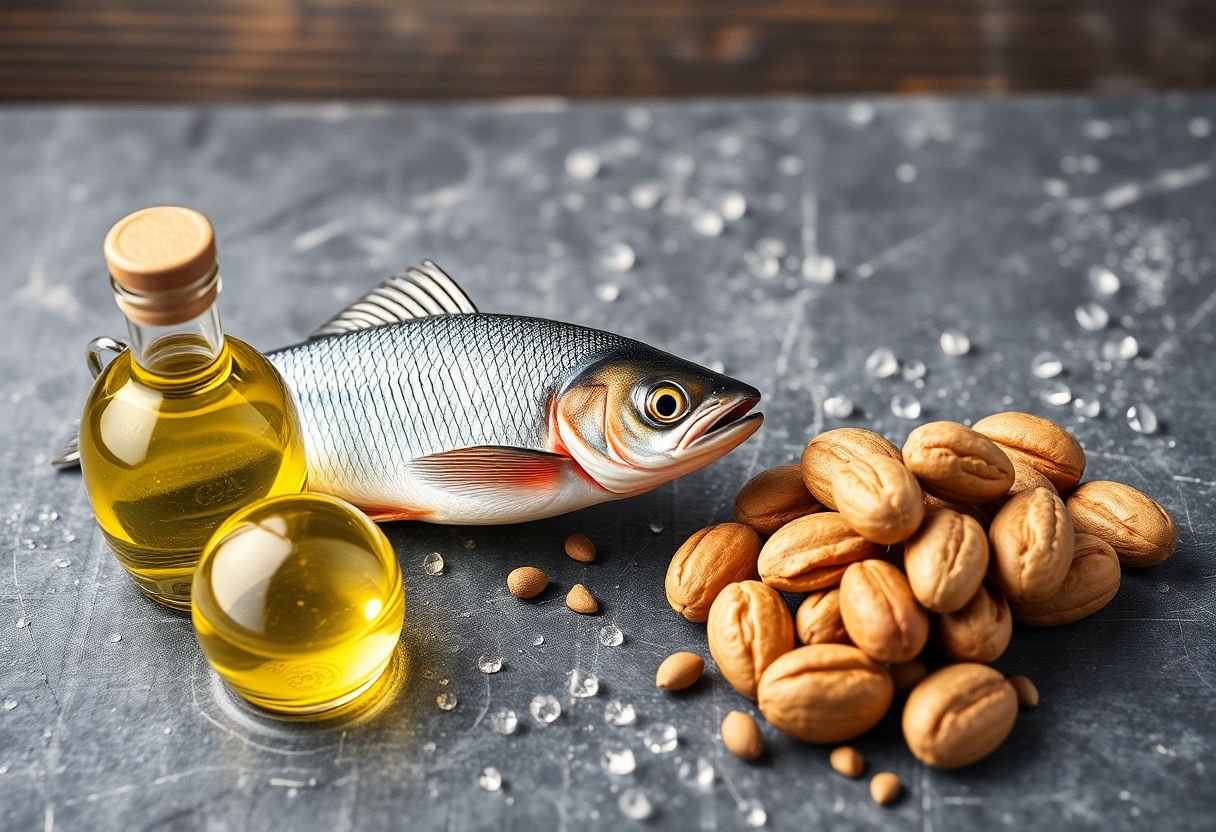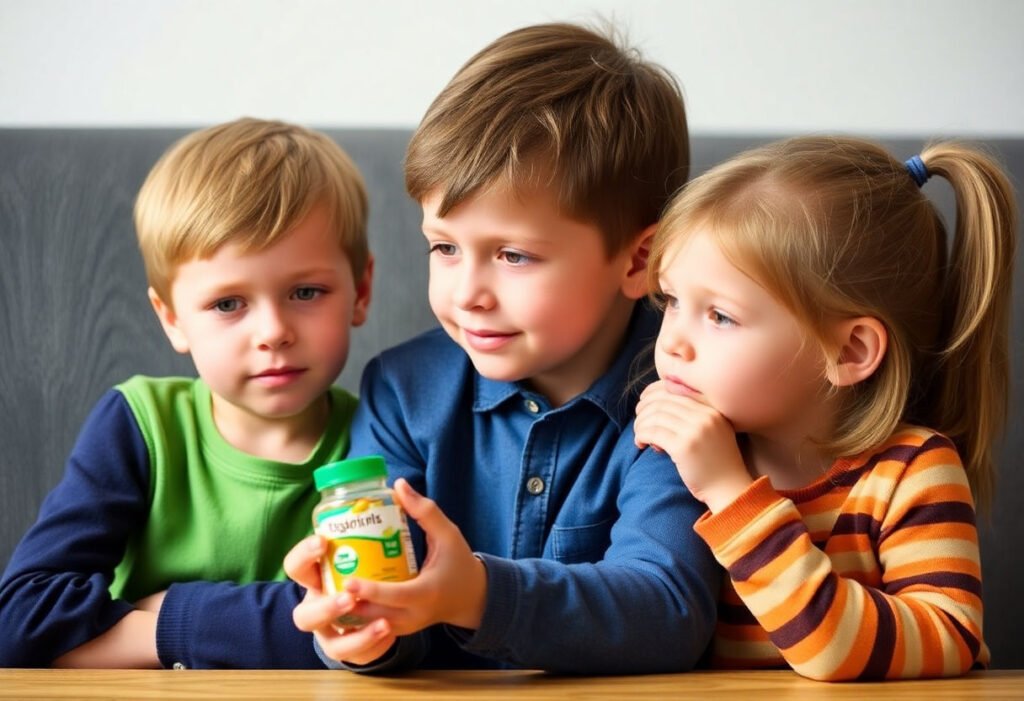Attention spans can wander like butterflies. But for children with ADHD, this struggle feels like a whirlwind. Parents seek ways to help these kids. Here, vitamins come into play. Nutrition holds power. Vitamins aid in boosting focus and managing ADHD symptoms. We’ll explore ADHD in children and dive into how good nutrition makes a difference. Learn about essential vitamins like Omega-3, Vitamin D, and B vitamins. Discover how they support brain health. Find tips for choosing the right supplements. With the right balance, focus can improve. Join us as we explore natural ways to help children with ADHD thrive.
Key Takeaways
- Kids with ADHD can improve focus and behavior through the right vitamins.
- Nutrition plays a big role in managing ADHD symptoms.
- Omega-3 fatty acids help brain function and reduce ADHD symptoms.
- Vitamin D links to better attention and behavior in children with ADHD.
- B Vitamins boost cognitive function, easing ADHD symptoms.
Understanding ADHD in Children
Children with ADHD often face challenges with focus and behavior. This condition affects how they pay attention and control their actions. Kids with ADHD might struggle to sit still in class. They might also interrupt others or make quick decisions.
ADHD comes with a few different symptoms. These can include being easily distracted and having lots of energy. Some kids may forget things often or seem restless. This can make learning harder. Kids might lose homework or have trouble staying organized. It can also affect friends. They may find it hard to take turns or keep calm during playtime.
Parents and teachers play a key role in helping kids with ADHD. Understanding and patience help children cope better. It is not about children being naughty. Their brains work differently.
Using real-life strategies also makes a difference. Imagine a teacher using a timer for short tasks. It breaks work into smaller steps. This can help the child focus better. At home, creating a calm area for homework can reduce distractions.
ADHD affects children in varied ways. Each child is unique, so methods that work well for one might not be the same for another. Providing support, patience, and creative approaches can unlock a child’s full potential.
The Importance of Nutrition in ADHD Management
Balanced nutrition plays a big role in managing ADHD symptoms. It can influence how well kids focus. Think of the brain like a car engine. It needs the right fuel to run well. For kids with ADHD, that fuel is food rich in nutrients.
Certain foods help. A diet with enough protein, like chicken and beans, can boost alertness. Whole grains release energy slowly. They keep kids going longer. Leafy greens and colorful fruits pack vitamins that improve thinking.
Iron is one important nutrient. It helps the brain get oxygen. Foods like spinach and red meat have iron. Zinc is another. It supports memory and behavior. You find zinc in nuts and seeds.
Magnesium calms the brain and improves focus. Think of it as a break for a tired mind. Bananas, avocados, and green vegetables have lots of magnesium.
Omega-3 fatty acids are found in fish. These healthy fats improve mood and learning. Dining on salmon or taking a fish oil supplement can help.
Each nutrient works like a small part of a larger puzzle. Together, they contribute to better focus. Adding these nutrients makes it easier for kids to learn and play.
Essential Vitamins for Improving Focus in Children
Children need the right vitamins for better focus. Vitamin B6 plays a big role. It helps make brain chemicals that boost mood and focus. You can find it in foods like bananas and chicken.
Vitamin B12 is like fuel for your brain. It helps keep brain cells healthy. You can get it from fish and eggs. Kids with ADHD often benefit from these.
Next up is Iron. This vitamin is key for focus and energy. Low iron can lead to trouble concentrating. Foods rich in iron include spinach and red meat.
Don’t forget Vitamin C. This vitamin helps protect the brain. It fights damage and boosts overall health. Oranges and strawberries are great sources.
Magnesium is another must. It helps the brain work well. It calms the mind, which can improve focus. Nuts and seeds are full of magnesium.
Finally, Zinc is a big helper. It helps brain function and mood. Foods like beans and beef have a lot of zinc.
These vitamins, while not magical, support better brain health. A balanced diet makes a difference. Always talk to a doctor before starting any supplements. Remember, combining these with good eating habits is best.
How Omega-3 Fatty Acids Influence ADHD

Omega-3 fatty acids play a key role in helping the brain work better. These fats are like the building blocks of the brain. They help with memory, focus, and even mood.
Children with ADHD often have lower levels of these fats. Boosting these levels may help these children focus better and be less fidgety. Omega-3s like EPA and DHA are the stars here. They are found in fish oils, like those from salmon or mackerel.
Experts say children with ADHD may benefit from omega-3 supplements. Think of omega-3s as the oil in a car. They keep the brain running smoothly. Without them, it can be harder to concentrate.
Parents sometimes notice changes when their children start taking omega-3s. Some report improved behavior and increased attention span in a few weeks.
Here are some benefits of omega-3s for children with ADHD:
- Better Focus: Helps with paying attention.
- Calmer Behavior: Reduces restlessness and fidgetiness.
- Improved Mood: Boosts overall mood and reduces irritability.
Getting omega-3s through diet is ideal. But supplements can be a good option if fish isn’t part of a child’s meals. It’s always a good idea to talk with a doctor before starting any new supplement. This ensures that the supplement is right for the child’s needs.
Omega-3s act like a friend to the brain. They support focus and calm in children with ADHD.
The Role of Vitamin D in Attention and Behavior

Vitamin D takes on a special role in helping children stay focused and manage behavior. Often called the “sunshine vitamin,” it comes from sunlight. But kids get vitamin D from food and supplements too. This vitamin helps with more than just strong bones. It helps the brain work right too.
Studies show that low vitamin D levels link to attention problems in kids. Think of vitamin D as a helper in the brain. It keeps everything running smoothly. Kids with enough of it often find it easier to pay attention and stay calm. Imagine trying to watch TV with a poor signal. Vitamin D clears up that signal to help messages travel.
Getting more vitamin D might help kids with ADHD do better in school and at home. Parents can help with this. Start with simple changes. More play outside helps. So does including food rich in vitamin D like fish, eggs, or fortified milk.
Supplements fill in gaps where sunlight and food can’t. Talk to a doctor first. Get the right amount for your child. Too much or too little won’t do the job.
In summary, vitamin D acts as a silent helper, clearing the way for better focus and behavior in kids.
B Vitamins and Their Impact on Cognitive Function

B vitamins play a big role in brain health. They help with energy, memory, and learning. Let’s look at a few types of B vitamins and how each one helps with focus and thinking.
B1 (Thiamine): Thiamine helps turn food into energy. Our brains need lots of energy. A boost in energy can mean a boost in focus.
B2 (Riboflavin): Riboflavin helps defend the brain from damage. This protection keeps the mind sharp and ready for problem-solving.
B3 (Niacin): Niacin helps with good blood flow in the brain. Good blood flow brings oxygen and nutrients, which keeps the brain awake and alert.
B6 (Pyridoxine): Pyridoxine helps make brain chemicals called neurotransmitters. These chemicals help send messages in the brain. This process helps with clear thinking and mood balance.
B9 (Folate): Folate helps with brain development. This vitamin is important for growing brains. It supports learning and memory, key in managing ADHD.
B12 (Cobalamin): Cobalamin helps keep nerve and brain cells healthy. This vitamin plays a part in focus and clear thinking.
Eating foods rich in B vitamins can support kids with ADHD. Foods like eggs, fish, and leafy greens offer lots of B vitamins. Including these in meals can boost how kids think and learn daily.
Choosing the Right Vitamin Supplements for Kids

Selecting vitamin supplements for children with ADHD involves careful choices. Not all vitamins are equal. Parents should know which ones help most.
Read Labels Carefully
Look for vitamins that support brain health. Omega-3s, Vitamin D, and B vitamins can help. Choose supplements that include these. Always check the label for these nutrients.
Consider Different Forms
Supplements come in many forms: gummies, liquids, and tablets. Some kids prefer gummies. Others might need a liquid form if they dislike swallowing pills.
Choose Quality Brands
Not all brands are the same. Pick brands known for safety and quality. Ask healthcare professionals for recommendations. They often know which brands parents trust.
Check for Allergens
Some supplements may contain allergens like nuts or gluten. If a child has allergies, read the ingredients list. Make sure the chosen supplement is safe for them.
Ask for Professional Advice
Before starting any supplement, talk to a healthcare provider. They can offer guidance based on a child’s needs. This makes sure the supplement choice is the best fit.
A final tip: keep an eye on how the child reacts to the supplement. Watch for any changes in behavior or energy levels. Adjust as needed with professional advice.
Monitoring and Adjusting Vitamin Intake

Keeping track of vitamin intake helps manage ADHD symptoms in kids. Think of it like tuning an instrument. You want the right balance for the best performance. For children with ADHD, vitamins play a key role. Parents and caregivers should observe how these nutrients affect their child’s behavior and focus.
Regular Check-Ups
A healthcare provider can offer guidance. Regular check-ups help monitor how well your child responds to vitamins. This step ensures their safety and effectiveness.
Listening to the Body
Kids often show signs if something is off. Watch for changes in behavior or mood. If your child seems off balance, adjust their vitamin intake. This might mean increasing or decreasing certain vitamins.
Common Signs to Monitor
- Changes in sleep patterns
- Differences in focus or attention
- Sudden mood swings
- Physical symptoms like headaches or upset stomach
It’s similar to adjusting a recipe. A pinch more salt can make all the difference. The same goes for vitamins. Small changes can have big effects.
Working with a Professional
Always seek advice from a healthcare provider before making changes. They can recommend proper dosages and adjustments based on your child’s needs. Too much of a vitamin can be harmful, just as too little might not help.
Adjusting vitamin intake takes care and attention. With guidance and keen observation, it helps improve focus and manage ADHD in children.
Conclusion
Vitamins play a crucial role in managing ADHD symptoms in children. They can enhance focus and improve behavior. Proper nutrition offers significant benefits for brain health. Balanced diets with essential nutrients, like Omega-3 fatty acids and Vitamin D, help manage ADHD. Parents may need to consider dietary changes for long-term benefits. Monitoring vitamin intake ensures safety and efficacy. It’s a journey of care and attention. Focusing on nutrition lays a strong foundation for children’s growth and development. Supporting children with the right nutrients empowers them to thrive in learning and daily activities.
Frequently Asked Questions
Can vitamins really help manage ADHD in children?
Yes, vitamins can play a role in managing ADHD. Nutrients like Omega-3 fatty acids, Vitamin D, and B vitamins support brain health, which can improve focus and behavior in children with ADHD.
What are the most important vitamins for children with ADHD?
Key vitamins include Omega-3 fatty acids, Vitamin D, and B vitamins. They help enhance brain function and attention in children. These nutrients help manage ADHD symptoms effectively.
How do Omega-3 fatty acids influence ADHD symptoms?
Omega-3 fatty acids support brain health. They help improve focus and reduce hyperactive behavior. Kids with ADHD often have lower levels of Omega-3.
Are all vitamin supplements safe for children?
Not all supplements are the same. Choose high-quality products. Look for trusted brands and consult with a pediatrician to find the right supplements for your child.
When will I see improvement from vitamins in my child’s focus and behavior?
Every child is different. Some may see changes in a few weeks, while others may need more time. Consistency and proper dosage, guided by a health professional, are key in observing improvements.


